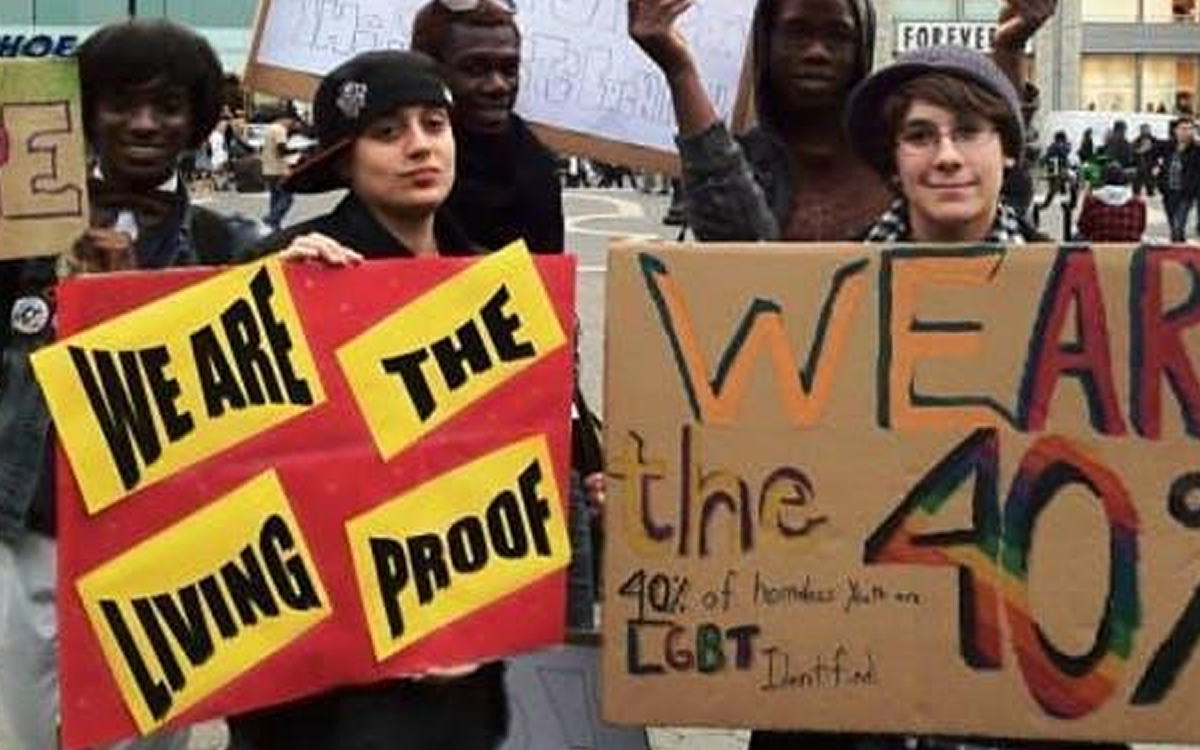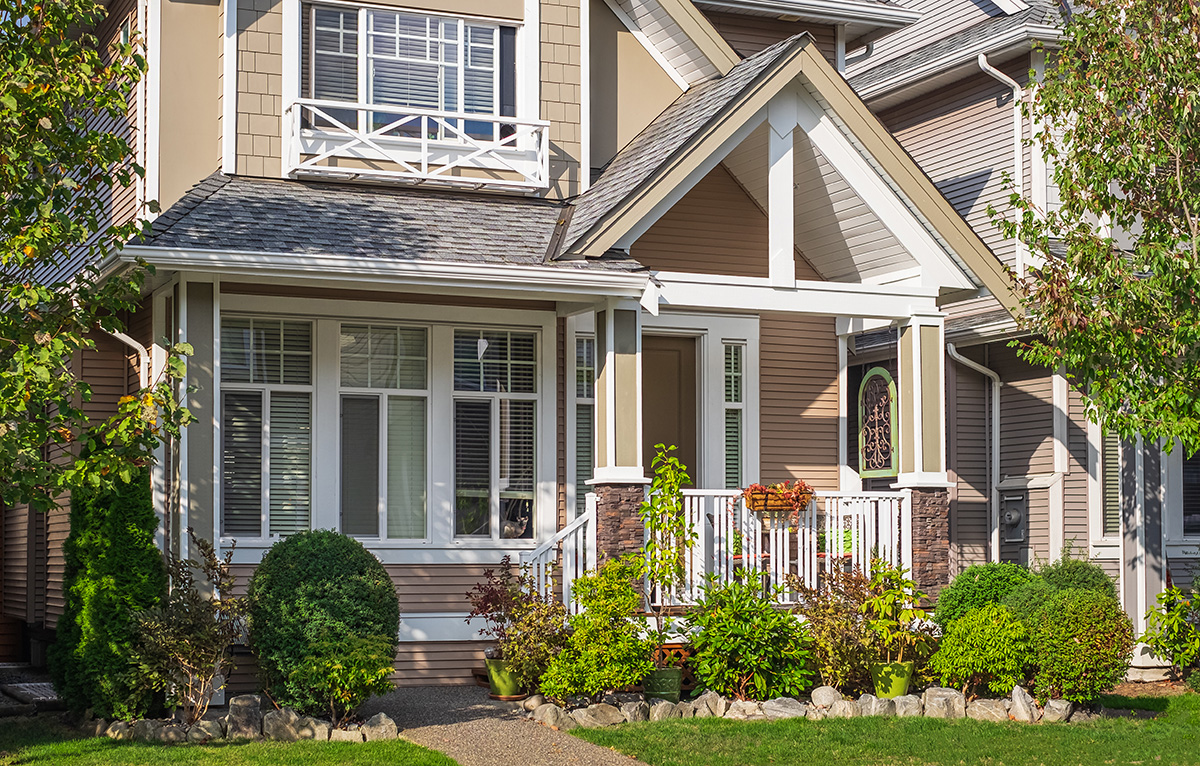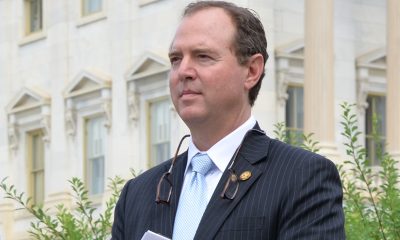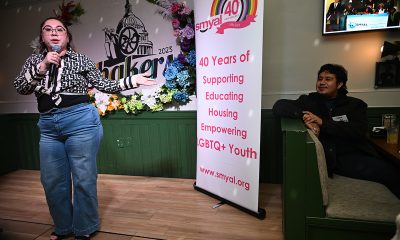Living
Combatting scourge of LGBTQ youth homelessness in D.C.
There are many local resources available to help

LGBTQ youth homelessness is a significant problem across the United States, but it is particularly acute in Washington, D.C. According to government statistics, a significant percentage of homeless youth in the country identify as LGBTQ. These vulnerable individuals face unique challenges due to their sexual orientation or gender identity, which often leads to estrangement from their families and communities.
In the lively, flashy streets of our hometown, Washington, D.C., and amid the city’s well-heeled new complexes like the D.C. Wharf in Southeast and City Centre Downtown, an alarming number of our youth find themselves without a place to call home, facing discrimination, abandonment, and societal neglect.
According to a 2022 article in DCist, “Queer and transgender youth are vastly overrepresented in the unhoused population. Nationally, 7% of people between the ages of 13 and 25 years old identify as LGBTQ+, while 40% of unhoused people of those same ages do. D.C.’s most recent Youth Count, which surveys the number of youth experiencing homelessness and housing instability, reports that the same is true in the District, with 40% of youth experiencing homelessness identifying as LGBTQ.”
Helping our youth may require more than just a simple annual or monthly donation. When you consider what you can do to help the District’s LGBTQ youth, you will want to do your homework to make sure the services you believe you are contributing to are reaching the youth in need. Below, you’ll find a few key elements to know to be informed and a few actions you can take to make a meaningful difference.
Discrimination isn’t the only cause of LGBTQ youth homelessness in our area. Several factors contribute to the high rates in Washington, D.C. One primary cause is family rejection, as many young individuals are forced out of their homes when they come out as LGBTQ.
Some families struggle to accept their child’s sexual identity or gender expression, leading to emotional or even sometimes physical abuse.
Discrimination in housing and employment also can play a significant role, making it difficult for LGBTQ youth to secure stable housing or find sustainable employment opportunities.
Additionally, the intersectionality of LGBTQ identities with race, ethnicity, and socioeconomic status may tend to exacerbate the issue.
LGBTQ youth from marginalized communities — African American and individuals of Latin American descent — are disproportionately affected by homelessness due to familial expectations and social stigma within ethnic or racial communities.
Homeless LGBTQ youth in Washington, D.C., confront numerous challenges that hinder their ability to thrive. These challenges include a lack of access to safe and affordable housing, limited educational opportunities, higher rates of substance abuse, mental health issues, and an increased risk of experiencing violence on the streets, or even exploitation.
Importance of support and resources
Addressing the scourge of homelessness for our youth requires a multi-faceted approach involving the government, community organizations, and individuals like you. The provision of safe and inclusive shelters is crucial, offering a supportive environment where young LGBTQ individuals can find refuge without fear of discrimination or harassment.
Moreover, comprehensive support systems must be established to address the unique needs of LGBTQ homeless youth. This includes mental health services, educational support, job training, and access to healthcare. Collaborative efforts between local organizations, policymakers, and the community can ensure that these individuals receive the care, resources, and opportunities they need to rebuild their lives.
Advocacy and policy changes
Advocacy plays a vital role in raising awareness and pushing for policy changes to combat LGBTQ youth homelessness in Washington, D.C. Organizations dedicated to LGBTQ rights and homelessness prevention actively work to promote inclusive policies, advocate for increased funding for support programs, and provide training to service providers to ensure they are equipped to address the specific needs of this vulnerable population.
LGBTQ youth homelessness in D.C. is an ongoing crisis that demands attention and action from individuals, organizations, and policymakers alike. Here are a few things you can do to help:
• Use Your Voice. Establish an ongoing voice in your ANC or your Ward on these matters. Reach out to your ANC commissioner if you feel your ANC can help. Start an ongoing conversation with the Constituent Services employees in your Ward member’s office and those offices of the At-Large Councilmembers. And reach out to the Mayor’s office when you have information that can help.
• Volunteer and Contribute. Volunteer your time and (when possible) financial support to organizations in the District that are making an on-the-ground difference. Volunteering can provide you a starting point to learn how the organization you seek to support operates and to see how efficient and effective they are internally at providing direct services to our youth.
• Know Your Partners. SMYAL does yeoman’s work working to establish healthy relationships with community organizations nationwide helping homeless LGBTQ+ youth. Learn about their work and see where supporting them makes sense for you. SMYAL does a lot to help housing providers exercise cultural competencies to address the needs of those homeless youth from our community. And SMYAL is just one group helping. Learn who your partners are.
So while significant progress has been made, there is still more work to be done to fully address the issue of LGBTQ youth homelessness in D.C. and nationwide. Ongoing advocacy, funding, and community involvement can be your leverage to help create sustainable solutions and ensure that all LGBTQ youth have access to safe housing, supportive services, and a chance to thrive in our great city.
Join CPM in contributing to local and national organizations focused specifically on LGBTQ+ youth homelessness such as the True Colors Foundation and SMYAL. Even the Salvation Army has a special program designed to reach our youth.
Resources and partners
True Colors Foundation. ”True Colors United,” founded by Cyndi Lauper and its executive director, Gregory Lewis focuses on addressing homelessness among LGBTQ youth. True Colors United works to raise awareness, provide resources, and support initiatives that aim to end homelessness among this population.
They collaborate with various stakeholders, including individuals, communities, government agencies, and service providers, to develop innovative solutions and implement policies that can effectively address the unique challenges faced by LGBTQ+ homeless youth. True Colors United also provides training and technical assistance to service providers, helping them create safe and inclusive environments for LGBTQ youth experiencing homelessness.
The Salvation Army. In the past, some LGBTQ activists and organizations have criticized the Salvation Army for discriminatory practices, specifically related to its treatment of LGBTQ individuals. Concerns have been raised about the organization’s position on same-sex relationships and its history of lobbying against LGBTQ rights.
It’s important to note that the Salvation Army is a decentralized organization, and its policies and practices may vary across different regions and locations. Some individual Salvation Army centers and programs may have taken steps to be more inclusive and supportive of LGBTQ individuals.
In recent years, the Salvation Army has made efforts to address concerns and improve its relationship with the LGBTQ community. They have stated that their services are available to all people, regardless of sexual orientation or gender identity.
SMYAL. SMYAL (Supporting and Mentoring Youth Advocates and Leaders) is an organization based in D.C. that focuses on supporting and empowering LGBTQ youth. While SMYAL primarily focuses on providing a range of services to LGBTQ youth, including support groups, counseling, leadership development, and advocacy, they also address LGBTQ youth homelessness.
SMYAL acknowledges that LGBTQ youth are disproportionately affected by homelessness due to various factors, including family rejection, discrimination, and lack of supportive resources. To address this issue, SMYAL offers specific programs and initiatives:
Housing Support: SMYAL provides assistance and support to LGBTQ youth who are experiencing homelessness or housing instability. They work with local partners to help youth find safe and affirming housing options, navigate the housing system, and access necessary resources.
Emergency Housing: SMYAL operates an emergency housing program known as the SMYAL House. This residential program provides temporary shelter and support services for LGBTQ youth experiencing homelessness. The program aims to create a safe and inclusive environment where youth can access resources, receive counseling, and work toward securing stable housing.
Outreach and Education: SMYAL engages in community outreach and education efforts to raise awareness about LGBTQ youth homelessness. They work to educate the public, service providers, and policymakers about the unique challenges faced by LGBTQ youth and advocate for policies and practices that ensure their safety and well-being.
Supportive Services: SMYAL offers a range of supportive services to LGBTQ youth, including case management, mental health counseling, employment assistance, and educational support. These services aim to address the underlying issues that contribute to youth homelessness and help young people build resilience and self-sufficiency.
Wanda Alston Foundation. The Wanda Alston Foundation is dedicated to ensuring that LGBTQ youth have access to services that improve their overall quality of life. Donations naturally continue their work to change the lives of LGBTQ homeless and at-risk youth for the better. Remote volunteer opportunities are available until we resume in-person volunteering. Current volunteer projects include: Social media management, website management, fundraising, policy review and development, and communications. Check out their website for ways to get involved.
Scott Bloom is senior property manager and owner, Columbia Property Management.
Real Estate
Spring updates to sell your home for pride and profit
Consider new landscaping, power washing, creative staging

Selling a home is a big deal for anyone, but for members of the LGBTQ+ community, it comes with unique considerations—from finding affirming professionals to ensuring your home is represented in a way that reflects your values. Whether you’re a first-time gay home seller or a seasoned LGBTQ+ homeowner looking to move up, maximizing your home’s value is key to a successful and empowering sale.
Here’s how to prepare your home, your mindset, and your real estate strategy to get the most value—financially and emotionally—from your home sale.
1. Start with an LGBTQ+-Friendly Real Estate Agent
Before diving into renovations or staging, make sure your agent truly understands your needs. A gay-friendly or LGBTQ+-affirming real estate agent brings more than just market expertise—they bring cultural competence, safety awareness, and a network that supports you throughout the selling process.
At GayRealEstate.com, you can find experienced, vetted LGBTQ+ real estate agents who have been proudly serving the community for over 30 years. Working with someone who shares or supports your identity ensures your selling journey is respectful, inclusive, and effective.
2. Enhance Curb Appeal—With a Welcoming Vibe
The outside of your home is the first impression a potential buyer gets. Make it count—especially for LGBTQ+ buyers looking for a home that feels safe and welcoming.
- Fresh landscaping: Add colorful flowers, neatly trimmed shrubs, or low-maintenance greenery to appeal to eco-conscious buyers.
- Update the entrance: A new front door, stylish lighting, or even a rainbow doormat can make your home feel like a safe space from the start.
- Clean and repair: Power wash the exterior, touch up paint, and make any necessary repairs to gutters, windows, or siding.
3. Stage with Intention and Inclusivity
Home staging can add thousands to your sale price. But beyond the usual decluttering and neutral palettes, think about how your space tells a story—and who it’s telling it to.
- Create a warm, inclusive feel: Subtle touches like LGBTQ+ art, books, or even coffee table magazines can show off your personality and affirm the space for queer buyers.
- Depersonalize—but don’t erase: You don’t need to hide your identity to appeal to buyers. Let your home feel lived in and loved—while still being a blank canvas others can imagine themselves in.
- Highlight multi-use areas: Home offices, gender-neutral nurseries, or flex spaces resonate with LGBTQ+ families and professionals.
4. Update Kitchens and Bathrooms Strategically
These rooms matter most to buyers—and even small updates can yield big returns.
- Kitchen: New cabinet hardware, a fresh backsplash, and modern lighting can elevate the entire room without a full remodel.
- Bathroom: Replace old fixtures, re-caulk tubs and sinks, and add plush towels and inclusive décor.
- Energy-efficient upgrades: Touchless faucets, smart appliances, or low-flow toilets are not only trendy—they signal sustainability, which matters to LGBTQ+ buyers.
5. Make Your Home More Energy Efficient
LGBTQ+ homebuyers often prioritize sustainability. These updates not only reduce energy bills but make your home more marketable.
- Install a smart thermostat (like Nest or Ecobee)
- Upgrade insulation or windows
- Consider solar panels (especially in sun-drenched regions like California or Florida)
Bonus: You may qualify for state or federal tax credits, which can be a great selling point.
6. Know and Advocate for LGBTQ+ Housing Rights
Although housing discrimination is illegal under the Fair Housing Act, it still happens. As an LGBTQ+ seller, be aware of your rights—and those of potential buyers.
- Avoid steering or bias: Even with good intentions, make sure you’re not inadvertently influencing who views or buys your home based on identity.
- Work with affirming professionals: From inspectors to lenders, choose partners who support inclusive practices.
- Report discrimination: If you or a buyer encounters bias, report it to HUD or your local housing authority.
7. Price Your Home Right—and Market It Smartly
Setting the right price is essential to maximizing value. Your LGBTQ+-friendly agent can run a comparative market analysis, considering current trends and buyer demographics.
- Leverage LGBTQ+ real estate networks: Promote your home through platforms like GayRealEstate.com to reach an audience that understands and values your space.
- Use inclusive language in listings: Avoid gendered terms or heteronormative assumptions. Instead of “his and hers closets,” use “dual walk-ins” or “double closets.”
- High-quality photos and video tours: Showcase your home with professional, visually inclusive marketing that appeals to diverse buyers.
8. Consider Timing and Local LGBTQ+ Trends
Selling during WorldPride or just before local LGBTQ+ events may boost visibility. Also consider if you’re in or near an LGBTQ+ friendly city or neighborhood.
Not sure which areas are top destinations? GayRelocation.com tracks and shares the best cities for LGBTQ+ homebuyers, helping you tap into motivated buyers.
Final Thought: Sell with Confidence—and Community
Selling your home isn’t just about getting top dollar—it’s about closing a chapter with pride and integrity. When you center your values, work with LGBTQ+ affirming experts, and prepare your home with purpose, you’re not just maximizing your home’s value—you’re creating an empowering experience for yourself and the next owner.
Whether you’re buying, selling, or both—GayRealEstate.com is your trusted partner in every step of your journey. With a nationwide network of gay and lesbian realtors, decades of experience, and deep community ties, we ensure your home transition is safe, smart, and full of pride.
GayRealEstate.com is the nation’s leading online platform connecting LGBTQ+ home buyers and sellers with LGBTQ+ friendly real estate agents, ensuring a safe and supportive experience.
Scott Helms is president of GayRealEstate.com. To find an agent or learn more, visit GayRealEstate.com, GayRelocation.com or call 1-888-420-MOVE.
Real Estate
Navigating DMV real estate market during political unrest
Reductions in federal employment have introduced uncertainties

The Washington, D.C.-Maryland-Virginia (DMV) region has long been recognized for its robust housing market, underpinned by the presence of the federal government and a diverse economic landscape. Recent massive reductions in federal employment have introduced uncertainties, yet the area continues to offer compelling reasons for prospective homebuyers, particularly within diverse communities.
While the federal government has traditionally been a significant employer in the DMV, the region has proactively diversified its economic base. Sectors such as technology, professional services, education, and healthcare have expanded, mitigating the impact of federal job cuts. This diversification fosters some economic resilience, which offers our area a semblance of protection against the impending unknowns that we currently face. Nothing can shield real estate entirely; however, our area tends to survive these types of changes better than other parts of the country.
Despite concerns over federal layoffs, the DMV housing market has demonstrated notable stability. Analyses indicate that the number of active listings, sold properties, and median sales prices have remained steady on a year-over-year basis. This steadiness suggests that the market is adapting to changes without significant disruption.
Furthermore, while there has been a slight increase in home listings, this trend aligns with typical seasonal variations and does not solely reflect federal employment changes. The luxury property segment, in particular, continues to thrive, indicating sustained interest and investment in the region.
The DMV region is renowned for its cultural and demographic diversity, with areas like Montgomery County, Md., being among the most ethnically diverse in the nation. This inclusivity extends to various communities, including LGBTQ individuals, fostering a welcoming environment that enhances the area’s appeal. Even though the current administration is fostering anti-diversity ideology, I remain confident that our LGBTQ community will continue to thrive even as these destructive forces work against us.
Local governments within the DMV have implemented policies aimed at promoting affordable housing and preventing displacement, particularly in the wake of economic shifts. Initiatives like the Douglass Community Land Trust in Washington, D.C., exemplify efforts to maintain housing affordability and support community stability.
Additionally, jurisdictions such as Montgomery County have longstanding Moderately Priced Dwelling Unit (MPDU) programs that require developers to include affordable housing in new residential developments. These policies contribute to socioeconomically mixed neighborhoods, benefiting diverse populations.
Despite Elon Musk’s brandishing of a chainsaw to the federal workforce, our real estate market continues to thrive. The DMV region maintains its appeal. Economic diversification, market stability, commitment to diversity and inclusion, and progressive housing policies collectively contribute to an environment that supports and attracts diverse communities. Prospective homebuyers can find reassurance in the region’s resilience and ongoing efforts to foster an inclusive and vibrant community. These are only a few among the many reasons to have a positive outlook while considering real estate options in our area.
It is important to consider working with brokerages, brokers, agents, lenders and title companies who align with our community and our objectives. Not all LGBTQ agents work for brokerages that support or understand the needs of the members of our community. Do your research and find out who has donated money to what political causes. Now more than ever we must support members of our community to protect our way of life and our very existence.
Stacey Williams-Zeiger is president/principal broker of Zeiger Realty Inc. Reach her at [email protected].

Hi Michael,
When I came to D.C. for college and came out, I was idealistic about finding true love. I made gay friends at school and watched them hooking up all the time.
It seemed like the opposite of what I wanted. I dreamed of meeting “Prince Charming” and living happily ever after. I thought I would put off sex until I met my special guy.
This went on for a while until I got too horny and impatient to keep putting off sex. The boyfriend wasn’t materializing so I went online and hooked up. Actually it was a lot of fun.
Soon I was hooking up as much as any of my friends were. I kept hoping I’d still find my prince. But over time most of my energy shifted to finding guys to have sex with.
Now I’m 34. I’ve been at this a long time and I realized the other day that I don’t like my life.
I haven’t been on a real date in years but I’m hooking up multiple times a week. I’ve been with almost everyone I see on the apps whom I find attractive (where the feeling was mutual). And yes, I’ve been with a lot whom I didn’t find attractive because I was horny.
I look at myself and I think, yuk. I don’t like whom I’ve become.
I feel like I am addicted to hooking up. I just keep craving something. The release but mostly the attention, that the other person finds me hot. After I come, I feel like the whole thing was pointless, and a little disgusted with myself. Advice?
Michael replies:
You’re using hookups not just for sex, but as a way to feel good about yourself by getting positive attention from others.
But other-validation is like junk food, a sugary snack that staves off hunger for a few minutes and never really fills you up. All those guys you hook up with? The attention feels great, but as you wrote, that feeling lasts until your orgasm. And then you’re back to chasing it.
As with junk food, the other-validation you get when you hook up is a lot of empty calories. Having someone you don’t even know agree to have sex with you says nothing meaningful about your worth or even your attractiveness.
Yet another problem: If you believe that you need other-validation, you will do all sorts of self-damaging behaviors to get it—such as hookups that leave you feeling empty and disgusted. I’ve seen many people lose their self-respect in the service of getting other people’s positive attention through behaviors that violate their own integrity. Doing things that make you feel bad about yourself in an attempt to feel good about yourself is ironic, and sad.
The bottom line is that other people can’t “make” you feel good about yourself. They might give you a small temporary boost, but your self-esteem actually has to come from you. That’s why it’s called self-esteem. Once you are past a certain age, if you don’t believe that you have value, no one else can get you there. You have to validate yourself.
Let’s go big-picture for a moment: It is our parents’ job to teach us that we have value when we are little, and when that doesn’t happen, we often struggle with self-esteem throughout our lives, unless we can find a path to develop our own belief in our worth. In the meantime, we may chase other-validation in a futile attempt to fill ourselves up.
Other experiences we go through—for example, growing up gay in a hostile environment—can also do a number on how we see ourselves, and leave us grasping for affirmation from others. It takes work to get through and get past the impact of these experiences.
So how do you get better at giving yourself the validation you are seeking? There’s a great saying from the 12-step programs: If you want to have self-esteem, behave in esteemable ways.
What would it mean for you to behave in a way that you respect? Your letter provides one answer that is true for you: Stop engaging in sexual encounters that leave you disliking yourself.
Far easier said than done, right? But that doesn’t mean it’s impossible. Having gotten clarity that you don’t like the life you’ve constructed for yourself, now you actually can do something about it. Keep in mind, though, that you will face some challenges if you stop hooking up.
First: You may find it isolating and scary to stop doing something that all or most of your friends are doing. You will have to reassure yourself that you’re doing what’s right for you; that you are taking good care of yourself by choosing to avoid behaviors that leave you feeling bad; and that it’s OK to be different from “everyone else.” In other words, you are going to have to get much better at self-validation.
If you have some friends who don’t spend a lot of their time hooking up, they may be good supports for you. Some guys find camaraderie from attending a 12-step program like Sexual Compulsives Anonymous (SCA).
Second: People often use hookups (and sex) not just for sexual gratification, but to soothe anxiety, stress, depression, and other uncomfortable feelings. If you stop hooking up, you will likely need some other ways to keep yourself calm and to steady your mood. Exercise and meditation are two obvious means.
You’d be wise to figure out new ways to fill your time that give you a sense of meaning and connection. I can’t tell you what those might be; only you can figure out what is right for you. They might include developing or deepening warm friendships, taking good care of yourself, finding a new activity that interests you — the list can go on and on.
If you still want to find your prince, this is the way to go about it. The cliché is true: You can’t expect anyone to like you unless you like yourself. If you build a life rich in fulfilling pursuits that help you to feel good about who you are and the life you are leading, you will be transforming yourself into relationship material.
Keep in mind, though, that letting yourself get close to someone through a heart connection would mean having to confront all sorts of uncomfortable emotions, including feeling vulnerable, that you have avoided by limiting yourself to crotch attachments.
That said, working to become a more solid person would help you develop the strength to tolerate the ongoing challenges of a close relationship.
Michael Radkowsky, Psy.D. is a licensed psychologist who works with couples and individuals in D.C. He can be found online at michaelradkowsky.com. All identifying information has been changed for reasons of confidentiality. Have a question? Send it to [email protected].
-

 El Salvador5 days ago
El Salvador5 days agoGay Venezuelan makeup artist remains in El Salvador mega prison
-

 State Department3 days ago
State Department3 days agoHIV/AIDS activists protest at State Department, demand full PEPFAR funding restoration
-

 Brazil4 days ago
Brazil4 days agoUS lists transgender Brazilian congresswoman’s gender as ‘male’ on visa
-

 District of Columbia5 days ago
District of Columbia5 days agoTwo charged with assaulting, robbing gay man at D.C. CVS store












